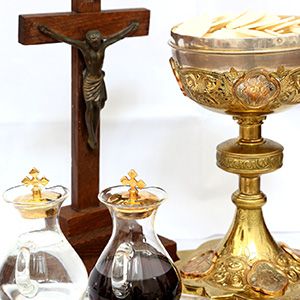
This is because the transformation of the bread and wine to the Body and Blood of Christ is the real, substantial change into the Real Presence of Christ, but not the material external change into the physical, glorified Body and Blood of Christ. St. Thomas Aquinas described this as the change of the underlying (invisible) substance, or essence, but the material “accidents” like colour, shape, smell, taste, and yes, the alcoholic effects are not changed.
In other words, the Eucharistic Body and Blood, if put under the microscope, would still show up as wheat and gluten, grape juice and alcohol. They would have the same detrimental chemical effect on a celiac patient or an alcoholic respectively. Yet they are truly and substantially Christ’s Body, Blood, Soul and Divinity.
How can this be? We don’t know. But we know that was what happened at the Last Supper and has been happening since. Jesus did declare “This is My Body… My Blood” while the appearance remains bread and wine. And He did pass on this power to effect the transformation to His apostles and their successors.
But then, we should not be too surprised. The God who could make all things out of nothing, can certainly change bread and wine to His Son without altering their appearances.


